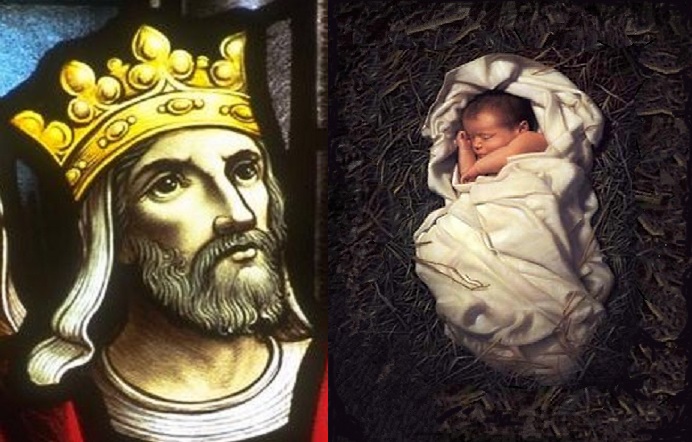Son
of David
Stephen
Terry
Commentary
for April 2, 2016 Sabbath School Lesson
 “For
to us a child is born, to us a son is given, and the government will be on his
shoulders. And he will be called Wonderful Counselor, Mighty God, Everlasting
Father, Prince of Peace.” Isaiah 9:6, NIV
“For
to us a child is born, to us a son is given, and the government will be on his
shoulders. And he will be called Wonderful Counselor, Mighty God, Everlasting
Father, Prince of Peace.” Isaiah 9:6, NIV
Often I have been told by those who would be Bible
students, but may prefer to find reasons not to be, how difficult it is to deal
with all the “begats.” In using a word commonly used in the King James Version of
the Bible, they are referring to what at times may seem to be endless and
pointless genealogies. They may feel this way because in the United States, we
do not focus so much on our ancestors as much as who
we are as individuals today. This may be because of the rugged individualism
that runs through our cultural history. This does not mean that there are not
those who study genealogy, but outside the religious need of the Mormon Church,
those studies are mainly for hobby purposes. Our attitude toward genealogies
may be a spiritual blind spot, however. There is often much to be gleaned from
those lists of “begats.”
Beyond knowing that Jesus was descended from King David,
many may simply skip over the first chapter of Matthew, eager to plunge into
the more interesting narrative to follow. But for Matthew, being a Jew and likely
writing for a Jewish audience, skipping over the genealogy would be
unthinkable. We should perhaps take that to heart and see what we can learn
from the genealogy as well.
The first thing that stands out is that this genealogy
does not begin with Adam, but with Abraham. In view of the messianic connection
often attributed to Genesis 3:15[i] that seems a little
surprising, since Matthew throughout his gospel is making the case for Jesus
being the Messiah. There may be a few reasons for this. They may not have attributed
the same messianic significance to that passage as we do today. It also may be
less of a concern to demonstrate that connection than it was to demonstrate
that Jesus, being a son of Abraham, was most definitely a Jew. In the same way,
Abraham’s genealogy[ii]
did not begin with Adam, but with Shem, apparently to demonstrate his Semitic
heritage as opposed to that of Ham or Japheth. If Matthew’s desire was to
demonstrate Jesus’ Jewishness, as he got going with the lineage, he ran into
some problems with that. He first had the descendants Isaac, Jacob and Judah.
Isaac and Jacob married Semitic women, but Judah married outside of Shem’s line
and married instead a descendant of Canaan,[iii] son of Ham. Although the
Bible does not say, since Judah married a Canaanite, Tamar, his son’s wife, may
have been Canaanite as well. However, this may not have carried the stigma it
did later after such marriages were banned. Interestingly, Tamar was only one
of a series of women in Christ’s genealogy who were not only non-Semitic, but
were fallen women in one sense or another. In Tamar’s case she seduced her
father-in-law into having sex with her by playing a prostitute. As a result she
became pregnant by him and had twins. This may not be the perfect ancestors one
might expect of the Messiah, but nonetheless Jesus came to be, in part, through
the DNA contributed by Tamar and Judah through one of those twins.
Later another genetic digression occurred when Joshua
took the city of Jericho. Rahab, the Canaanite prostitute, was spared from
destruction along with her family. She ended up marrying Salmon, who was the
great, great grandfather of King David. Consequently we had more Canaanite DNA
injected into the Messianic line. This was DNA that apparently God had wanted destroyed
for He had commanded the utter destruction of the Canaanites.[iv] It seems strange that God
would bring the Messiah through that DNA then, but things get more confusing
still.
David’s great grandmother was Ruth who married Boaz,
Salmon’s son. Perhaps because of his father’s decision to marry Rahab, Boaz was
more open to marrying an outsider. Ruth was a Moabitess, a descendant of the
incestuous relationship between a drunken Lot and his oldest daughter. On the
surface this may have seemed less problematic since the Moabites were also
Semitic, but because of how they treated the Israelites during the Exodus, God
had commanded that no descendant of either of Lot’s daughters (Moabites and
Ammonites) could enter the congregation of Israel even to the tenth generation.[v] Yet, here we have Ruth
marrying Boaz and only three generations later, her great grandson is on the throne
of Israel. That seems somewhat of a short cut past the ten generation rule. Perhaps
a conservative biblical literalist would have pointed out that Tamar’s pregnancy
was not biblical, sparing Rahab and marrying her was not biblical, and David’s
ascension to the throne after only three generations from Ruth’s marriage to
Boaz was not biblical, but even if they were right, God played a trump card and
made them ancestors not only of King David, but also of the Messiah. Maybe then
as now, these seemed like unimportant divergences from the biblical standard,
but over time they came to have an important impact on who eventually became
King of Israel and produced the messianic lineage.
Why wasn’t one of Judah’s sons by his Canaanite wife the
carrier of the promised seed instead of Perez? Why was Rahab, the Canaanite prostitute
part of the messianic line? Perhaps the answer can be determined through what
happened with King David later. Although he had several wives and concubines,
David was attracted to the wife of one of his military officers, Uriah, a
Hittite. He had sex with her and she became pregnant. David then arranged to
have Uriah killed to cover up the adultery. But what may be hidden from men is
not hidden from God. David’s marriage to Bathsheba was allowed to stand, but
the son born from their adultery died. Nonetheless, out of all of his wives and
concubines, the messianic seed was passed to Bathsheba and through her to
Solomon. Interestingly, this whole business was apparently so distasteful to
Matthew many centuries later that he could not even bring himself to write her
name in Christ’s genealogy. Although he listed the other foreign women by name,
he only called Bathsheba “she who was the wife of Uriah.”
Why are all these foreigners found in Jesus’ bloodline?
Couldn’t God have kept the bloodline pure? There may be several reasons why
things happened the way they did. One possible reason is that God may have not
wanted any special, magical significance attached to that bloodline. Perhaps he
wished to avoid the idea of righteousness by marriage with offspring from the right
parents assuming they were somehow more holy than others. This possibly could
have caused a tiered society with those with the right bloodlines at the top
and the rest below. How easily this can happen may be seen with the idea of a
class of nobility that came to dominate society by the Middle
Ages. To some degree, we still have not passed beyond that social disease. It
may even have played a role in James, Jesus’ brother, assuming leadership in
Jerusalem in the decades after his Brother’s ascension.
Another reason things could have developed the way they
did is that God does not normally interfere with man’s will. These liaisons and
marriages may have taken place due to the will of the individuals involved
without regard to any commands God had given, much as Eve exercised her will at
the Tree of the Knowledge of Good and Evil in spite of what God had previously
told her. Adam partook of the same per his will. In other words, God allowed these
things to take place, but then turned them to His purpose of bringing the
Messiah when the time was right. We see an example of this in Jesus
incarnation. In spite of the opposition of Herod, the ignorance and arrogance
of the priests, and the indifference of the people, Jesus came as a baby and
grew in wisdom and stature until the time of His revealing to the people.
A third reason things may have taken place as they did,
was the universality of Christ’s sacrifice. He did not come to save only the
Jews. He came to save all mankind. A fitting symbol of that may be found in the
fact that His DNA was not only Jewish, but also was in part derived from the
foreign genetic code carried outside the Judaic family. Through that genetic
breadth, he literally not only suffered and died for the Jews but for all men
and women everywhere. Therefore all may approach the cross boldly, knowing that
not only are they approaching the Savior of the world, but a Brother, one like
us in every way, One who understands us to the very depth of our DNA. How
special is that?
